
Welcome to

| Home | Photos | Guestbook |
| Newsletter | Links | Contact |
**This web site is published by a private individual
and does not represent the official views of the Peace Corps or the U.S.
government.
Dear Family and Friends:
It has been six months since many of you have heard from us. We apologize for the lapse of time. We are experiencing the same challenges here that we knew so well from our lives at home: there never seems to be enough time to do all that we want to do. However, time in Thailand somehow feels different. The fact that we have been here over ten months is shocking to us. Two years seems like such a long time to be away from home, but it truly feels like such a short time to be here. Therefore, without wasting time, we’ll proceed to give you an update about our life and share a few recent experiences from the last, crazy six months. After reading this "Newsletter #2", please respond with your reactions, thoughts and questions. We had a lot of fun communicating with many of you last time, so please don’t hesitate to respond on the comments section of the website or send us an e-mail directly! We’d love to hear from you. Really!
Introduction
They say that volunteers start to get their feet on the ground after about six months at site. That has proven to be the case with us as well, however "getting our feet on the ground" may need definition. If it means we should know exactly what we are to do here, how to proceed and speak the language with proficiency, then we are far from it. However, if it means we should start to feel comfortable in our new environment, begin to understand how some things work here, are finding a few people we can work with, and started several projects then perhaps we have all four of our feet at least partially on the ground. It has been very challenging indeed, but an adventure that we are enjoying thoroughly. Boredom is by no means an issue.
Have We Found a Routine?
One would think that after six months at our site, we would settle into a daily routine. However, our life seems to be anything but routine. In fact, the only routine we have come to expect are the many surprises that we experience every day. The Thai’s haven’t stopped surprising us nor have our lives slowed down since our last newsletter in December. We still encounter countless unexpected surprises in the form of events, invitations or meetings that people either forget or neglect to tell us about, or seemingly occur spontaneously.
A large part of these events are the numerous holidays. Recent events include: the rocket festival (imagine huge 12 foot bottle rockets), cub scout day, sport day(s), health volunteer day, mothers day, fathers day, the King’s birthday, Buddha’s birthday, honor your teacher day(s), various merit making events at the temple, weddings, monk initiations, Thai New Years, Western New Years, Christmas….the list seems endless. In spite of this we do seem to be making progress on a number of different areas.
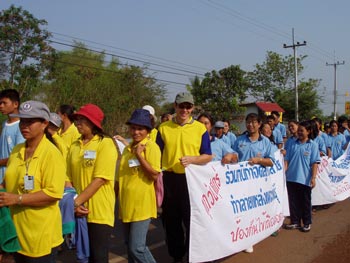


What Have We Been Doing?
The answer is complicated and one that is hard to answer concisely. In simple terms, listening, learning, and conversing followed by questioning, suggesting, braining storming, motivating, encouraging, reminding, a little pushing, and if we are lucky, helping people make things happen!
During our initial months, we have been learning more than we had ever expected about ourselves, each other, and a heck of a lot about Thailand and our villagers. We have been listening to people talk about their work, lives and ideas. We have been conversing about how to do things differently and new things innovatively. In the process we have tried to offer a fresh perspective and perhaps get involved if they are interested. Then sometimes we continue on this series of verbs including motivating, encouraging, reminding, and pushing. Finally, in a couple cases we have been lucky to help make a few humble things happen!
After all, in addition to fostering cultural exchange, this is why we are here. Isn’t it? At least, after these first seven months, that is what we are thinking. We are starting to learn about how to properly undertake all of these verbs as part of our unique role in this community as its volunteer community developers. In general, helping motivate people to do something to help themselves…. helping them empower themselves.
The people with whom we are working represent a broad spectrum and whose education ranges from 4th grade to some with a college degree. They include our local government office, three day care centers, two elementary schools, a high school, a university, a silk weaving group, two snack groups, a mushroom group, and a health center. The following are a few recent activities: teaching English and team building workshops, visiting local NGO’s, writing grants, working in the rice and vegetable fields, catching fish in the mud, making natural fertilizer, refereeing soccer games for kids, making soap, conducting market research on silk, visiting other silk groups, attending trade shows, helping with health exams at the health center, competing in an aerobic competition, meeting government officials that might help our groups, fixing computers, setting up a new website for Peace Corps Volunteers, arranging trainings, visiting schools that have frog, fish, chicken or pig lunch projects, and formulating feasible projects with each other, or other volunteers and, most importantly with our local counterparts.
Two big projects that we are excited about have been at local schools. The first is helping a school principal with his new library. The principal has worked very hard to build a library with funds donated by the community. The total cost is about $5,500. It has taken over two years to slowly obtain 2/3 of this total. He has been slowly building the building as the money has trickled in. Most of the funds have been donated by Thai laborers working abroad in Taiwan or Korea. We wrote a grant proposal last month to an NGO (Non Government Organization) and hope to hear later this month whether or not we will receive enough funds to finish the project.
We also recently finished assisting another school on a grant proposal to
expand the school lunch program. Currently in Thailand, schools only receive
limited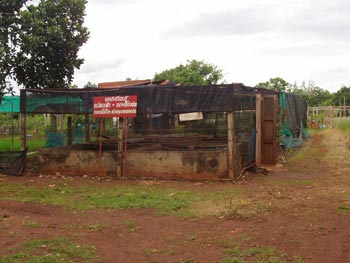 funding to provide lunches to needy children. In this case the amount is
approximately $0.10 per child per day. In our area the government estimates that
approximately 60% of the students cannot afford lunch. As a result many teachers
and students attempt to supplement their lunch programs by raising chickens,
vegetables, etc. The project at this school is to expand an already successful
fish project from 30 kilos of fish to 150 kilos per month. Both of these
projects are particularly challenging because we are working very closely with
our counterparts to write proposals in both Thai and English. It is a new
experience for us and the schools, but we hope that in the end, the kids will
not only have more fish for lunches, but the principal and teachers will be able
to write grant proposals on their own after we are gone. Dare we say it….
"teaching them to fish for a life-time"… as the proverb goes. In any case, we
have our fingers crossed and hope that these first efforts are successful.
funding to provide lunches to needy children. In this case the amount is
approximately $0.10 per child per day. In our area the government estimates that
approximately 60% of the students cannot afford lunch. As a result many teachers
and students attempt to supplement their lunch programs by raising chickens,
vegetables, etc. The project at this school is to expand an already successful
fish project from 30 kilos of fish to 150 kilos per month. Both of these
projects are particularly challenging because we are working very closely with
our counterparts to write proposals in both Thai and English. It is a new
experience for us and the schools, but we hope that in the end, the kids will
not only have more fish for lunches, but the principal and teachers will be able
to write grant proposals on their own after we are gone. Dare we say it….
"teaching them to fish for a life-time"… as the proverb goes. In any case, we
have our fingers crossed and hope that these first efforts are successful.
Another exciting project involves the creation of an English Club at one of our schools, several daycare centers, and about 60 donated children’s books from the U.S.A. A wonderful NGO called Darien Books out of Connecticut sent us two boxes of used children’s books. The students in this new English Club are translating the books into Thai for use by the daycare centers and kinder gardens. We are excited about this project because it addresses several issues, including sorely needed books, team work between teachers and the start of a new English Club for the students. The kids absolutely love it and it has given them an opportunity to learn English and create something valuable for the community.
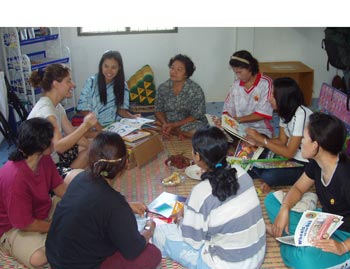
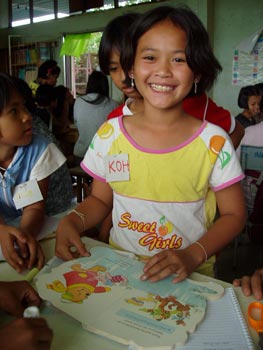
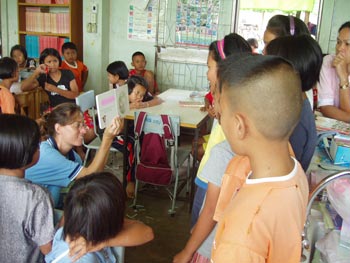
We recently assisted another Peace Corps Volunteer (PCV) in a really cool team building workshop. The volunteer received funds from a multinational in the region to fund this new workshop for teachers. It included three days of team building exercises, discussions and problem solving. We had a great time helping to create it and we hope to replicate it in the future with at least one of our groups.
Perhaps one item that you may have noticed on the list of activities above is
the health exams. Vanessa has started getting involved with a variety of health
issues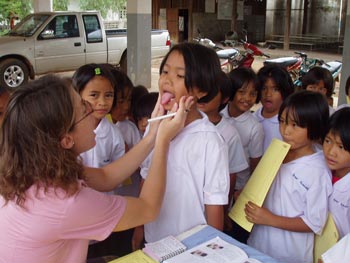 including children’s health, breast cancer and HIV/AIDS In Thailand
funding for women’s annual exams is limited and regular check-ups don’t begin
until after 35 years of age. Therefore, Vanessa found that she was actually more
experienced than many of the young health workers in conducting breast exams. As
a result she as become involved with checking patients and teaching women how to
conduct their own exams at home. The women are quite receptive in learning how
to do this at home. One of the funny outcomes of her work is a new nick name in
the village as "The Boob Doctor." She is also getting involved with HIV/AIDS issues. We recently learned about
several kids who lost one or both parents to the disease. Vanessa attended a
Peace Corps workshop and is helping to start a new committee of volunteers on
the topic. She is also a member of a committee in our district to focus on this
issue in our area. We hope to be able to address HIV/AIDS more directly in the
future in our village. However, the initial challenge seems to be perceptions of
whether or not it is a potential problem in the village. It seems like most
people we talk to say that "there was AIDS here, but those people have all
died." In talking to people it appears there is a lack of general knowledge on
the subject resulting in a general fear of the talking about the disease.
including children’s health, breast cancer and HIV/AIDS In Thailand
funding for women’s annual exams is limited and regular check-ups don’t begin
until after 35 years of age. Therefore, Vanessa found that she was actually more
experienced than many of the young health workers in conducting breast exams. As
a result she as become involved with checking patients and teaching women how to
conduct their own exams at home. The women are quite receptive in learning how
to do this at home. One of the funny outcomes of her work is a new nick name in
the village as "The Boob Doctor." She is also getting involved with HIV/AIDS issues. We recently learned about
several kids who lost one or both parents to the disease. Vanessa attended a
Peace Corps workshop and is helping to start a new committee of volunteers on
the topic. She is also a member of a committee in our district to focus on this
issue in our area. We hope to be able to address HIV/AIDS more directly in the
future in our village. However, the initial challenge seems to be perceptions of
whether or not it is a potential problem in the village. It seems like most
people we talk to say that "there was AIDS here, but those people have all
died." In talking to people it appears there is a lack of general knowledge on
the subject resulting in a general fear of the talking about the disease.
Is the work interesting? You bet; and a lot of fun! But we both agree this experience has been far more difficult than we ever imagined. In fact, the most difficult challenge of our lives.
What’s so Challenging?
Wow, where to begin…language, cultural, psychological, physical………….
Of course, language is obvious. Unexpectedly, however one of the most challenging aspects of our experience has been cultural. Patience has been paramount and maintaining a positive mental attitude when so little initiative or urgency seems to exist has been tough… very tough. A few specific experiences:
1) We have been talking to an assistant principal at another school for months about doing a chicken project. He continually expresses his desire to do the project, but we can’t do it for him. Getting him to initiate the first few steps seem elusive.
2) We worked very hard to secure a spot for one of our silk weavers at a training offered by a professor at the university. The day before the training, the group leader decided that she couldn’t go. She never really gave an explanation. Was she scared to leave the village to attend a training with people they did not know? We didn’t know, but we kept trying to work with the group. We got another training opportunity for weaving designs. She and her sister talked about it and seemed genuinely determined to go this time. Unfortunately, we were extremely disappointed when suddenly we couldn’t get a hold of the trainer who was to tell us about the specific location and time of the training. Ultimately, we missed the opportunity once again.
4) One of our women’s groups runs a small food stand on a main road that has a relatively large amount of traffic. There are several women in the group but before any of them will be able to earn any money from the enterprise, they need to increase their sales. Since, the stand is somewhat hidden from view, the most immediate means to achieve higher sales appears to be making themselves more visible to potential customers. But, every time Cullen suggests that they make a sign advertising the food stand, they tell him that none of them can write nicely.
One of the most frequent frustrations for Cullen is the lack of urgency. As mentioned before, we are learning a great deal about our selves. Cullen has learned that he is not as patient as he thought. He is starting to become accustomed to the following types of conversations:
Cullen: Sing (who is a teacher), I have a friend that works for a private company in Bangkok who said she could collect donated items for poor kids at her office.
Sing: Great idea. Have you eaten yet?
Cullen: Yes. What items do you think the kids need?
Sing: What did you eat? Bread?
Cullen: Toast and jam. Anyway, about the donations….
Sing: Why do foreigners like bread so much?
You get the idea....
Finally, psychological challenges involve things like constant attention everywhere we go (except for Bangkok and tourist areas). In the general area of our site, people of all ages show their surprise at seeing us, try to speak to us or somehow react when they see us. The reactions are often pleasant and fun or weird [like a loud yell of "you, you, you." or "farang" (foreigner)]. Depending on our mood at the time, these responses are either funny or irritating.
At our village, people still react, but generally everyone seems to know us now and actually call us by our real name names instead of "farang" (foreigner). But the word "farang" is widely used. Kids as little as 2 know the word and constantly say it when they see a foreigner. By now we are used to hearing it, but it can still be disappointing when our close friends use the word "farang" in place of our names when talking about us to other people while we are right next to them. Oh, well…. We have come to realize this may actually be a term of respect.
Another aspect of the constant attention is the touching. It is common for people of the same sex to hold hands, lean on each other or put an arm on each other while walking or hanging out. However, people of the opposite sex would never touch affectionately in public. While this has not been a big deal for Vanessa, it has taken Cullen some time to get used to. It is not uncommon for a man that he just met to hold Cullen’s hand for several minutes while initiating conversation. It is even worse when the men are drunk because they never let go of him. The lack of personal space can apparently be limitless. While this has not yet happened to Cullen yet, several male volunteers have complained that some Thai men have not hesitated to check the size of certain private body parts. Ahh, ya…..
Another psychological challenge, that we realized we must overcome, involves the ubiquitous bugs, ants, geckos and any assortment of flying annoyances that bite, buzz or just annoy. We realized that we are getting used to being here when we stop to think about whether or not it would be easier to remove the ants from the water in our water bottle before or after we drink from it. In fact, as we type this letter we are ignoring the weird flying moths that are bouncing between us and our computer screen at the moment, as well as the four other unidentifiable and distinctly different species of bugs that are currently wondering up and down this screen.
Finally, one experience that nearly caused us a mental break down was the 4:30AM Aerobics that took place less than 150 feet from our front door at the health center. The Royal Thai Government has done a great job encouraging people to exercise with the wide-spread availability of aerobics instruction at the nation’s health centers. We learned that many of the villagers here, especially women, love it. Unfortunately, evening aerobics was not a convenient time for people due to work and chores. Somehow the early, early morning time fit best into their agriculture life-styles here. Therefore one of the enthusiastic volunteers at the health center started to offer the classes in the morning. The response was unbelievable! On some mornings, we saw 50 -60 people dancing away to super loud, western techno music. This is compared to 6 -10 people in the evening. At 6 PM this involvement would have been wonderful to see. But we have learned that adequate sleep is essential for tackling the challenges of each day. Therefore, this was a major problem that we could do absolutely nothing about. In fact it is a weird phenomena here. Loud music, which makes communicating with the person next to you virtually impossible, is the norm at parties, restaurants, weddings, karaoke, on buses, or even at funerals. No one seems to mind that the music continues until 3 or 4 AM. Our Thai friends seemed to have an incredible ability to sleep through anything. These morning techno raves literally caused our bed to vibrate. When I asked our neighbor if he could sleep through the aerobics, he said it was no problem. Incredible! Compounding the situation were the pleas for us to join. The people are so wonderfully gracious and they invite us to be involved with everything. Aerobics was no exception. So it was difficult to get angry when people would yell Vanessa’s name below our window for her to join.
Thank goodness these morning aerobics lessons were short lived. Almost as suddenly has it started, it stopped within a month or two. Once the enthusiastic leader’s husband came home from working aboard in Korea for 3 years, she stopped setting up the sound system in the morning. No one has since replaced her even though so many people seemed to enjoy it. In some ways it is too bad. But we just couldn’t deal and are thankful that it stopped. We still sometimes wake up early in the morning when we hear voices outside and dread the day the someone else gets motivated to restart the morning aerobics program. We just hope that our dislike, which was impossible to hide, didn’t have anything to do with the reason it no longer takes place.
How’s the Weather?
Without a doubt, during the last two months our greatest physical challenge has been the severe heat. Temperatures over 100 degrees were the norm and our ability and desire to bike the 10 kilometers to the south part of our village was all but zero. We used to laugh at the way many Thais wear long-sleeved shirts, jackets and hats during the summer. But now having felt the intense sun during these hot days, we understand. Sometimes the sun feels like being at the focus of a sun beam through a magnifying glass. There have been more than a few days when we directed our two fans onto ourselves at midday and tried NOT to move in fear of increasing our body temperatures unnecessarily. Those are what we call "three shower days," due to the number of times we would bathe to cool off.


We finally, decided to take our first vacation on one of the islands off the gulf coast to get way from the Isan heat. The ocean breezes were nice, but forget about the "refreshing" sea water. The water in the Gulf of Thailand is bathwater! Fortunately, the hot season is coming to a close now and we are starting to get a flavor for our next seasonal experience- the rainy season. If last week was any indication, it should be interesting and wet. After a recent rain storm, we found that our shoes, along with our friends’ shoes had washed away in the resulting floods. The other day we decide to move our refrigerator to higher ground for fear that the water would breach the threshold of the house. It almost did and we wonder how soon we will find the geography of our house altered by a new water feature on the first floor!
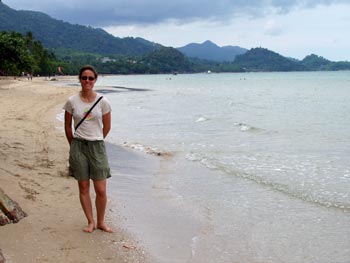
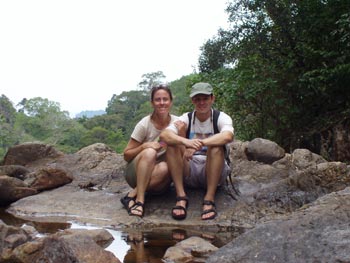
How are we doing with the Language?
We are now, more or less, to a point that general conversation is manageable and we can actually find the bathroom, order a dish with "cooked" meat, and negotiate the cost of a kilo of mangos from $0.25 to $0.23. However, now we are constantly searching our dictionaries for specific vocabulary for things such as: "What type of accounting system do you use to track your revenues and expenses?" "What is the yield per fish pond per month?" and "Are building tree forts at the school really part of the curriculum?"
Ironically, the words that trip us up the most are those the Thais have adopted from English. Yes, you would think that those English adoptions to the Thai language would be "gifts." But no way, they are conversational death traps that can lead to funny looks and stares of incomprehension. We always have to think before using them: "how do the Thais say this word?" It can literally take us 5 – 10 times of repeating the words before people understand what we are saying. Examples: freestyle = feestai; accident = awseeden; Christmas = kisma; townhouse = tow-how; football = foo-bawn; mall = maw; lipstick = lipdee; and one of our favorites Vanessa = Wanesaaa; Cullen = Helen
In Thai the gap between speaking and reading is vast. The other day we spoke to a former Peace Corps volunteer who has been living here for over 20 years. While his Thai was excellent, he said that his ability to read was still very shaky. It’s that hard. The language has 44 consonants and 32 vowels. We still can’t remember the sounds of all the vowels when we try to read them. Compounding the difficulty is the way the words are written in sentences. There are no spaces between words! Therefore sentences are one long endless string of letters.
One of the most rewarding things we have done is to begin to learn Lao (or the Southern Isan dialect of Lao). Thailand has numerous languages. In our immediate village the primary language spoken in most homes is Lao, followed by some Cambodian. Central Thai is used on TV and newspapers, but the people we work with typically speak Lao with each other. Most of the older people or very low educated seem to speak Lao exclusively. As you might imagine this has been particularly challenging and frustrating after having studied so hard to learn Thai. Yes, indeed, but not entirely, because the languages are pretty similar. I don’t know what percent of the languages use the same words, but it seems to be around 50%. Therefore by learning some key words and getting used to the tonal changes, we can start to understand conversations. During the second phase of our training in February, Cullen spent all of his language time learning Lao while Vanessa stayed with Thai. We then tried to teach each other what we learned. (Some volunteers tried to learn Cambodian. Ugh!) The rewards of speaking Lao have been bountiful. We not only, can understand our neighbors at lot more, but the reaction we get from people when we try to speak Lao has been a lot of fun. They absolutely love it! Now, it seems there are some people in the village whose primary ambition with regard to us is to teach us new Lao words every chance they get.
What’s new for Dinner?
Between the two of us, we have tried the following new culinary delights recently: Snake, chicken feet, frog, rat, red ants, red ant eggs, and fried beetles. The rat came from the rice fields so it was "clean." Our friend who made it for us described how she craved rat throughout her pregnancy. Both times Cullen ate rat, he thought it was surprisingly good. The grilled chicken feet were interesting. Since Thais eat them so often, Cullen thought there must be some meat on the bones that taste good. But no, meat at all, just bone. Cullen’s friend told him it was a good source of calcium. While this is true, he couldn’t get himself to eat the feet. He was able to wrap them up in a napkin and put the bundle in his backpack before being offered grilled chicken liver. Lastly, we saw fried spiders and scorpions last month in a market, but, unfortunately, we did not have the pleasure of tasting them.
Any New Lessons?
Mangos are our favorite fruit. In our last newsletter we described the variety of exotic fruit here, nearly all of it delicious. There was an abundance of mangos in April. The taste of these mangos even made up for the heat. We had no idea that mangos could be so delicious. There are several varieties and we have discovered that "flower water" mangos are the sweetest and the closest thing we have ever experienced to tasteful bliss. We ate several a day during April.
Thai bulls are also attracted to bright red colors. Vanessa learned this lesson one morning while jogging in the rice fields. Fortunately, the herder was adept at using his stick on the cow’s head, which distracted him away from Vanessa.
Always add fish sauce and sugar when making food for our Thai friends, even if it is western food. We have become accustomed to our friends adding fish, oyster sauce and other distinctively Thai sauces to pasta dishes no matter if it is a tomato, crème or pesto sauce.
You can use a rice cooker for more than rice. So far Vanessa figured out how to steam vegetables, make pasta, prepare pancakes and even cook a whole lasagna in our rice cooker.
According to one of our Thai friends, Vanessa is more beautiful now in Thailand with a little sun, and Cullen was more handsome at home when he was a little "fatter." He has lost about 10 pounds while living here.
Always be prepared for guests. On the morning we were to be paraded through the streets on a horse for the Rocket Festival, our Thai friends were busy dressing us up in traditional custom, plus loads of make-up (as you will note on Vanessa’s face in the photo). It was hectic. Therefore, we were taken off guard when we received a call from our Thai niece. It was the niece of our host "mother," who hosted us for two months in Chainat during our initial training period in September and October. She informed us that our mother and her sister boarded a bus at 6AM that same morning to come visit us for a few days. She had mentioned several times that we needed to come visit her and we have only visited once since we left 8 months ago. She said she missed us and wanted to see us. But, we didn’t expect her to come. For a 67 year old Thai women who has never spent much time away from her village and cannot drive a car, the trip would be complex; not to mention long - about 7 hours. Yet sure enough after three buses and a 30 minute, three wheeled taxi ride to our village, she showed up at our door with her older sister. Luckily our niece informed us of her arrival early so we had someone meet her. The visit was a surprise, but we had a very nice weekend playing several rounds of UNO. It was nice to see her again. It was also very gratifying to be able to speak more Thai with her than we used to those first few months.
Some bugs belong on your shoulder. One day Cullen saw a large preying mantis on the shoulder of one of our colleagues. In a knee-jerk response, Cullen brushed off the menacing bug. After a quire look, the colleague informed Cullen that the bug was actually good luck. Oops!
If you don’t use a language you lose the ability to speak it. Cullen was devastated a few weeks ago when we encountered a German fellow in the district town. He was at our only internet café. Having studied German for five years Cullen used to be pretty good. To his shock and utter disappointment, his sentences were an awkward combination of Thai and German. While they were able to communicate a little bit, Cullen would have been much better off trying to speak Thai or English with the poor fellow who was utterly confused.
No privacy for the foreigners. We had assumed the children would eventually get bored of us, but not yet. The other day we were sitting in our house reading when we heard a shutter of several little feet quickly approaching our house from a distance. Upon reaching the front door we heard a loud thud as the little boys jumped onto the metal door frame to look in at us. Their boldness was really funny. In addition, we have a lot more visitors. As people have become more comfortable with us they often stop by to visit at anytime of the day. As mentioned previously, 6:30AM is not considered early in our village. Therefore, it is not uncommon for us to have visitors at this time. If our door is not open yet, they tease us for getting up late
How to agree and accept requests and invitations with out sincerely intending to follow through. We are often asked to do things, attend events, teach English or go places with people we may or may not know. It can be culturally insensitive for us to turn them down outright, especially if they are someone in an important position. Therefore, we think we are starting to learn how to use the valuable skill of agreeing to do things in a manner that both parties in the conversation know it will not really happen. This is a very complicated cultural exchange that other volunteers have described. While we are probably not very good at it yet, the disingenuous agreement method has proven to be very valuable in recent months. We only wish we had learned it earlier.
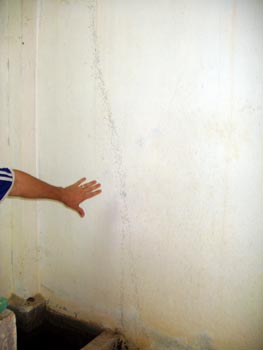 Ants rarely cross chalk lines. Ants are ubiquitous here. We find them in the
weirdest places, including in our fridge, on our tooth brushes and in our sealed
water bottles. In fact watching ants is a well none volunteer pastime. It is
often amazing to see long black lines of ants seemingly appear on our wall over
night and then disappear just as quickly. Where they are going to and coming
from is a mystery. They are also relentlessly ambitious. We have seen single
ants carry a bug many times its own body size up our wall. They come in a
variety of sizes from the tiny black ones that we find in our house to the half
inch red ants that really hurt when they bite. We once
Ants rarely cross chalk lines. Ants are ubiquitous here. We find them in the
weirdest places, including in our fridge, on our tooth brushes and in our sealed
water bottles. In fact watching ants is a well none volunteer pastime. It is
often amazing to see long black lines of ants seemingly appear on our wall over
night and then disappear just as quickly. Where they are going to and coming
from is a mystery. They are also relentlessly ambitious. We have seen single
ants carry a bug many times its own body size up our wall. They come in a
variety of sizes from the tiny black ones that we find in our house to the half
inch red ants that really hurt when they bite. We once found a football sized
red-ant nest in our mango tree. When our neighbor decided to retrieve the ant
eggs, we couldn’t go out our back door for two days for fear of getting attacked
by these angry killer ants. It seems like people here in the country must have
stopped trying to fight them years ago, so they just eat them instead. Fortunately,
found a football sized
red-ant nest in our mango tree. When our neighbor decided to retrieve the ant
eggs, we couldn’t go out our back door for two days for fear of getting attacked
by these angry killer ants. It seems like people here in the country must have
stopped trying to fight them years ago, so they just eat them instead. Fortunately,
another volunteer showed us a special chalk that the ants hate. Therefore we have decorative rings around the legs of the shelves that hold our food. It has worked remarkably well.
Jokes are endlessly recyclable. It seems like inevitably, we have a similar conversation when we meet new people. It goes something like this:
Oh you speak Thai very well, followed by a series of questions, usually including the following: How many years have you lived here? What country are you from? Why do you speak Thai so well? Do you like Thai food? Can you eat spicy food? Is the weather hot here? Where do you live? Do you have a Thai spouse or a second wife? What are you doing here? How much do you make? Do you miss home? Is it cold in your country?
By now we know the answers to these questions in both Thai and Lao thoroughly and we often throw in a few jokes to make it interesting. They also inevitably result in a lot of laughter and fun. In fact, when we are in a pubic place other people are sure to stop and listen or join in on the conversation. A few examples:
"No, Thai language is very difficult, we only speak Thai snake, snake, fish, fish." They love this joke. It is a Thai idiom that we often say again in Lao for even more laughter.
"No, I don’t want a girl friend. I am married to another foreigner. One love for one heart." Another Thai idiom that always gets a joyous response from the Thai women in the group and sometimes an argument to the contrary from the Thai men.
"Yes, we can eat spicy food, but Vanessa eats papaya salad with just one chili and Cullen eats it with just two." They inevitably laugh and inform us that they eat it with 5 - 10+ chili’s. "We then say that if we ate salad with such a large number we would die." More Laughter ….
What Else is New?
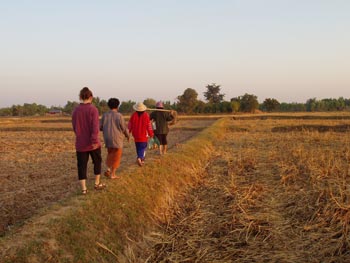
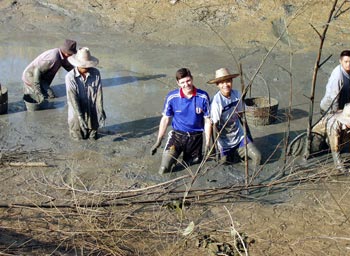
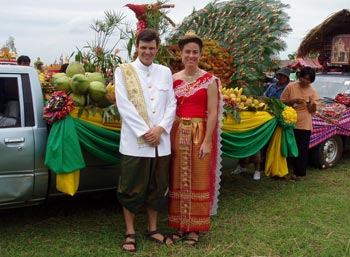
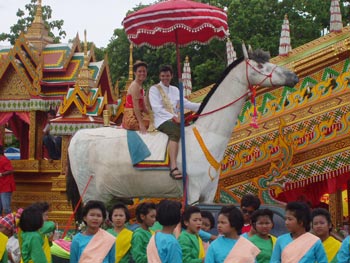
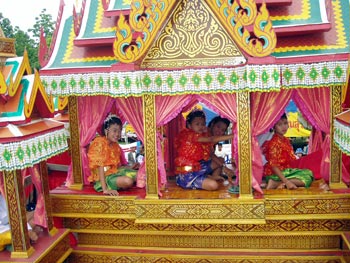
What is a quintessential Peace Corps Moment?
There are so many unique experiences during our days here that are funny, frustrating, beautiful and/or just crazy. We like to call them Peace Corps moments because we couldn’t imagine them happening anywhere else but in the Peace Corps. We thought we would share one of Cullen’s with you:
I found myself sitting in the back of a wooden cart that was pulled by an irrigation pump. The farmers use these 3 horse power pumps to power the wheels on their carts to and from the rice fields. I am sitting next to a 60 year-old women who just lifted my muddy mountain bike with ease from the ground into the back of her wood, two-wheeled cart. I just finished a meeting with a school principal about scholarships for poor students and my kaki Dockers are now muddy and wet. I look at my Peace Corps issue mountain bike. Although covered in mud, it still looks oddly modern and flashy sitting in this rickety old farmer’s cart. I feel like a time machine just dropped me off here. The tires of my bike are caked with this red clay, which caused me to get stranded. The road below us is nearly impassable due to an endless river of mud. It is the rainy season. This kind women is talking incessantly. She seems so happy to have me in her cart. She yells to people in the huts on the side of the road that she picked me up a few kilometers back. She is clearly proud of "saving" me. I can actually understand most of what she is saying. She is not only speaking Isan Lao language, but she also has a mouth full of red beetle nut (similar to chewing tobacco but it turns the mouth and teeth a vibrant red). The fact that I can understand her astounds me. The cart is going no more than 2 miles per hour. If the road weren’t deep in mud, I could walk faster. The rain has subsided, the clouds are parting and the sun is setting over freshly planted rice fields as far as I can see. I am wet, tired and dirty, but I feel fantastic.
The many difficulties and challenges we described here may give some of you the impression that we are not enjoying our experience. Quite the contrary, we are having an experience that we will cherish the rest of our lives. Sure it’s very, very hard in many more ways than we are able to describe here. But this experience has been incredible - filled with both very lofty highs and very deep lows. On any given day we will feel down and depressed, then suddenly something happens that gives us an unexpected sense of love, appreciation, and conviction toward the people we work for about why we are here. Sometimes we feel productive, while other times we feel like an unusual form of entertainment for our villagers. Regardless, we are grateful for this opportunity and proud America created a unique program like the Peace Corps which has made it possible.
Of course we do not know what the months ahead will bring. All we know is that our "routine" will likely be as crazy and unpredictable as it was the last several months. We just hope that in the midst of it all, we can continue to make friends, exchange our cultures in a positive way, and if we are lucky, help a few people along the way.
We hope you all are well and we look forward to hearing from you.
Your Friends,
Vanessa and Cullen
P.S. Remember the women’s group that seemed intimidated to go to training outside of the village? Well, just before completing this last part of the newsletter, we were lucky enough to secure a spot for the group at another training offered by another professor. It was designed to improve silk dying methods. It was a great experience to watch them talk to another weaving group similar to themselves, who had turned their weaving skills into income. The training was good, but the greatest value was the opportunity for them to realize their own potential through these conversations. This experience was one of those highs. Maybe not a big thing but, hopefully it may prove to be significant down the road. We’ll let you know how things go with them and everyone else in our next newsletter.
UPDATE: August 23,2004. This week Vanessa and I were really busy and got good news! First I found out that our school lunch fish project will get funded ($1,200)! So, once we complete this project the school will produce over 130 kilos of fish for kids’ lunches per month (at least that is what the teachers projected, which is as accurate as my projection of my red blood cell count). A lot of these kids are malnourished, so I am really pleased about this. We are also going to allow the kids who work on the project to be responsible for accounting and production. When they have profit, they will be able to split it with the school either in the form of fish or actual money. The students will be 7 – 9th graders. We also received word about our school library project. We will receive $1,000, as well as a number of used computers. I am most pleased with the computers because this school only has about 100 students and 6 teachers. Therefore, it is too small for government computer donation programs. Earlier in the week, I spent a lot of time with people from the mushroom group in our village. This is a group we, regrettably, haven’t been able to spend a lot of time with and it was nice to finally work more together. I learned about how they began producing straw mushrooms a few years ago at substantial profit. Now, they are battling with mold, which now eats away over 50% of the earnings they used to receive. Therefore, after doing some research, I found a manual done by a Peace Corps volunteer in Thailand nearly 20 years ago. I think it may have the solutions these villagers need. However, you know how scientific I am. So I invited another volunteer to come help me. He is 60 years old and worked for 30 years as a research biologist for the University of Florida. I am really excited about the prospects of helping these folks because I think it may be our first real opportunity to help raise peoples’ income in a relatively substantial and short time frame. I also hope it will help a few other volunteer who are going to join the effort. Mushrooms are a great secondary occupation that we may be able to help spread. Finally, I also spent several days working with the social studies teacher at the high school. The Peace Corps has a great world map project that shows teachers how to paint a world map on the wall as an activity to teach kids. I have been pushing several teachers on this project for some time. Then I finally found the right guy about a month ago. Suddenly in a three day period, we went from talking about it to finishing the painting. It suddenly became urgent due to the timing of a forthcoming art show at the school next week. On the first day, I found myself wondering the grounds of the school in search of adequate plywood. After 30 minutes, I was helping him dismantle the walls of a small building that I believed used to house an art class (ironically). Suddenly this 6’x12’ sheet of plywood that used to serve as a wall was the canvas of our world map project. Now three short days later, our world map project is nearly done. However, I am frankly ambivalent. I can’t really say that it’s artistically beautiful nor that the kids learned a great (at least so far). The project seemed to snowball and after making numerous suggestions about how to integrate the kids and do fun learning games, this teacher and his friend were off to the races. In fact they got so enthusiastic about it that they spent most of the last days and nights doing most of the work themselves. In addition, they also decided to enjoy a few Elephant beers while working late into the night. Thus, you might imaging that the result, (“art work”?) is less than esthetic or entirely accurate. (e.g. florescent prink Russia, neo green Brazil and a Spain that looks to be several thousand miles from Morocco!!!) However, by now I have learned how much influence I can truly have in some circumstances, so I just went along with it trying to hide my mixed emotions of surprise, disappointment and laughter. I also tried to make a few suggestions along the way. Now I just hope we can incorporate the students more in labeling the map. Also I hope we can organize a few games and learning activities that Peace Corps provided. In spite of the craziness, I guess the net effect is positive. The teachers have learned more about the geography of the world and also about an interesting technique for drawing large images. Oddly, now the teachers are spending this weekend using the same over-head projection technique to paint a map of Thailand! And the biology teacher is using the technique to draw images of the inside a human torso. In some ways this is the way many projects come together here. I am just pleased that they liked my idea in the first place, then they took it and made it their own… even if they mixed it with beer!